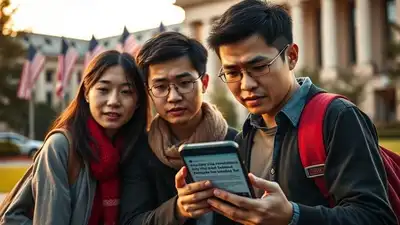
Chinese students in US face growing fear as visa revocations target top universities. (AI Image)
Chinese students in the United States are reeling from the announcement by US Secretary of State Marco Rubio that some student visas will be revoked, specifically targeting those in "critical fields" and individuals with alleged ties to the Chinese Communist Party.
The move, which comes amid growing tensions between the US and China, has sparked confusion, fear, and outrage among the Chinese academic community across American campuses.Rubio's decision affects a large portion of the international student population. According to the 2023–2024 academic year data, more than 270,000 Chinese students were enrolled in US institutions, making up nearly one-quarter of all foreign students in the country.
China remains the second-largest source of international students in the US, following India.Concerns of discrimination and historical echoesThe announcement has drawn sharp criticism from students and officials alike. Linqin, a Chinese student at Johns Hopkins University, expressed dismay and described the policy as a "new version of Chinese Exclusion Act," referring to the 19th-century law that banned Chinese immigration and citizenship.
He told the Associated Press that Wednesday was the first time he considered leaving the US after spending a third of his life there.China's Foreign Ministry was quick to condemn the move. Spokesperson Mao Ning said the visa revocations were "unreasonable" and "politicized," accusing the US of undermining its own values of freedom and openness. "China has lodged a protest with the US," she added, as reported by the Associated Press.A growing point of tension in US-China relationsThe issue of Chinese students studying in the US has long been a flashpoint in bilateral relations. During President Trump's first term, visa rejection rates increased for Chinese applicants, and many saw shortened visa durations. The current decision echoes those earlier crackdowns and is seen by many as a further deterioration of trust between the two countries.Last year, the Chinese Foreign Ministry raised concerns over multiple cases where Chinese students were interrogated and deported at US airports, calling the actions unjust. The Associated Press reported that Chinese state media have repeatedly highlighted issues such as US gun violence and political unrest, painting the country as unsafe for its citizens.Uncertain futures and shifting academic choicesFor students like Zou Renge, a master's student in public policy at the University of Chicago, the policy shift has caused a sudden change in life plans.
Zou told the Associated Press that she had initially planned to take time off and work abroad in humanitarian aid but now feels compelled to stay in the US and seek immediate employment due to the visa uncertainty.Meanwhile, other regions are eyeing the opportunity to attract displaced talent. In Hong Kong, Chief Executive John Lee told lawmakers on May 29, 2025, that the city would welcome students "facing unfair treatment" under US policy.
As reported by the Associated Press, he stated, "This is an opportunity for Hong Kong."Alternative destinations gain groundEducation consultancies in Hong Kong, such as AAS Education Consultancy and Litz USA Student Service, report a rising number of students now shifting applications from US universities to institutions in the UK and Australia. Kitty Wu, director of Litz, said future applicants are increasingly considering universities like the University of Hong Kong, a shift that was uncommon in previous years.Zhang Qi, a postdoctoral fellow in Beijing, remarked to the Associated Press that the US move may inadvertently benefit China by keeping talented individuals at top institutions like Tsinghua University and the Chinese Academy of Sciences. "Having fewer international exchanges is definitely not good for America's development," he said.As many students await clarity on their visa status, anger and anxiety continue to mount within the Chinese academic community in the US, leaving long-standing hopes of educational and cultural exchange hanging in the balance.

 19 hours ago
108
19 hours ago
108


























 English (US)
English (US)